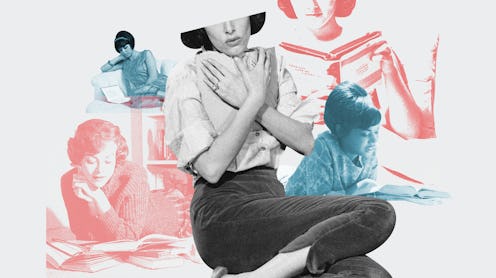
In case you haven’t noticed, the coronavirus outbreak has completely upended the world of dating and relationships as we know it. The divorce rate spiked after couples in China came out of government-mandated isolation. All of a sudden FaceTime dates with Tinder matches sound pretty damn charming. We’re in dire times, people.
There’s plenty of CDC-recommended advice for fighting the coronavirus, like keeping your hands clean and distancing yourself from others. But for all of the folks starving for love and affection while stuck in their homes, I’ve got some other advice: It’s time for us to get over our sexist misconceptions of the romance genre and pick up romance novels en masse instead.
Readers — especially women — have long turned to these books as a way to process difficult moments in their lives and in the world at large. (Myself included.) “For people who are unsettled, it’s comforting to know that your experience reading a book will ultimately end in a happy ending. That’s what you need: In the end, it will work out,” The Worst Best Man author Mia Sosa tells Bustle.
Many newcomers are now finding solace in them, too. New York-based editor Elena Nicolaou started getting into the genre about a year and a half ago, but the coronavirus outbreak has turned the casual romance reader into a loyal fan. “Stories about love in all of its forms move me the most [and] romance novels [are] literally a dopamine hit of that. I go in knowing I’m going to get a really wonderful story of human connection,” says Nicolaou. “Ironically, I’m stuck in this reality where physical connection is potentially harmful. I’m retreating into these books not only because they make me feel good [but] also to remind myself of the way things were.”
For healthcare consultant Astha Berry, who’s eyeballs deep in research about her industry’s current chaos, romance novels offer levity and escapism. She’s also found that reading them with her partner (who she’s quarantined with), is a new kind of intimate experience they can share in the age of social distancing. “When I was reading Get a Life, Chloe Brown, [my partner and I] read a lot of passages out loud,” she says. “I like to have him read to me because I can show him what I like. This sounds corny, but I asked him if he could write or describe me the way that someone would be described in a book with the little things you wouldn’t normally notice, like how [the love interest] Red describes Chloe Brown’s legs. It was really sweet.” (For those quarantining alone, reading romance novels is also a great solo activity to help stave off your cabin fever-induced horniness.)
Steaminess aside, these novels provide a safe place to process very real issues that can seem insurmountable elsewhere. “Romance has always been about reflecting the time that we’re in. It’s a reflection of what women and marginalized people are feeling in the world,” says romance author Sarah MacLean. Like how in the aftermath of the early 2000s Great Recession, there was a rise of Christian Grey-esque billionaire romances, Or when #MeToo first ignited, romance novels began to explore power imbalances and sexual harassment. “We can have that conversation in the text and separate the terror and the fear and the worry on the page [from real life], and in the end, everything is OK.” If your current fantasies include a superhero love interest swooping in to bring you Purell, you’re not alone; it’s just a sign of the times.
In my case, romance novels have saved my sanity many a time as a writer covering politics, and being in isolation has only made my need for a hopeful story all the more pressing. People used to mock my love of the genre, but it’s funny how living in a dystopian world order with no toilet paper and only chocolate hummus has made folks reconsider. Besides, it’s a little more upbeat than watching Contagion for the fifth time.
If you think you’re showing symptoms of coronavirus, which include fever, shortness of breath, and cough, call your doctor before going to get tested. If you’re anxious about the virus’s spread in your community, visit the CDC or NHS 111 in the UK for up-to-date information and resources, or seek out mental health support. You can find all Bustle’s coverage of coronavirus here, and UK-specific updates on coronavirus here.